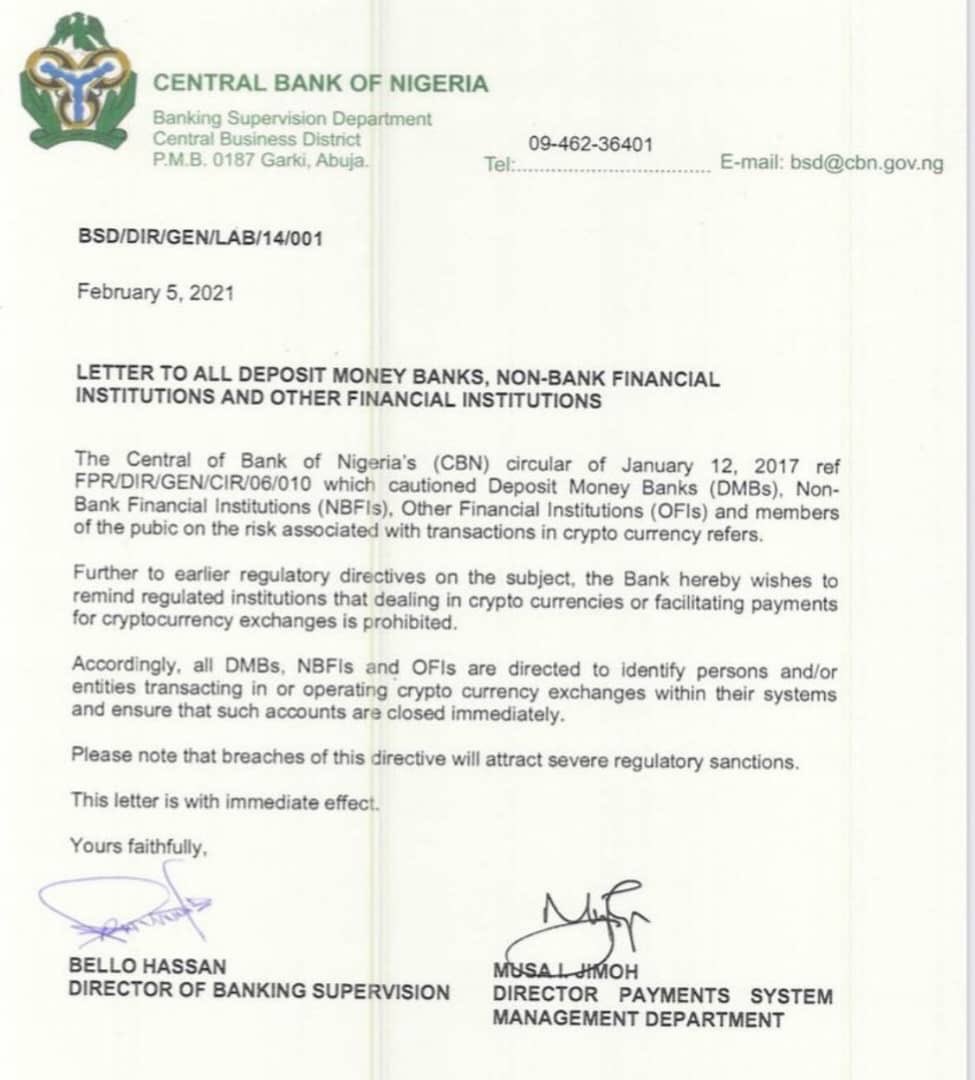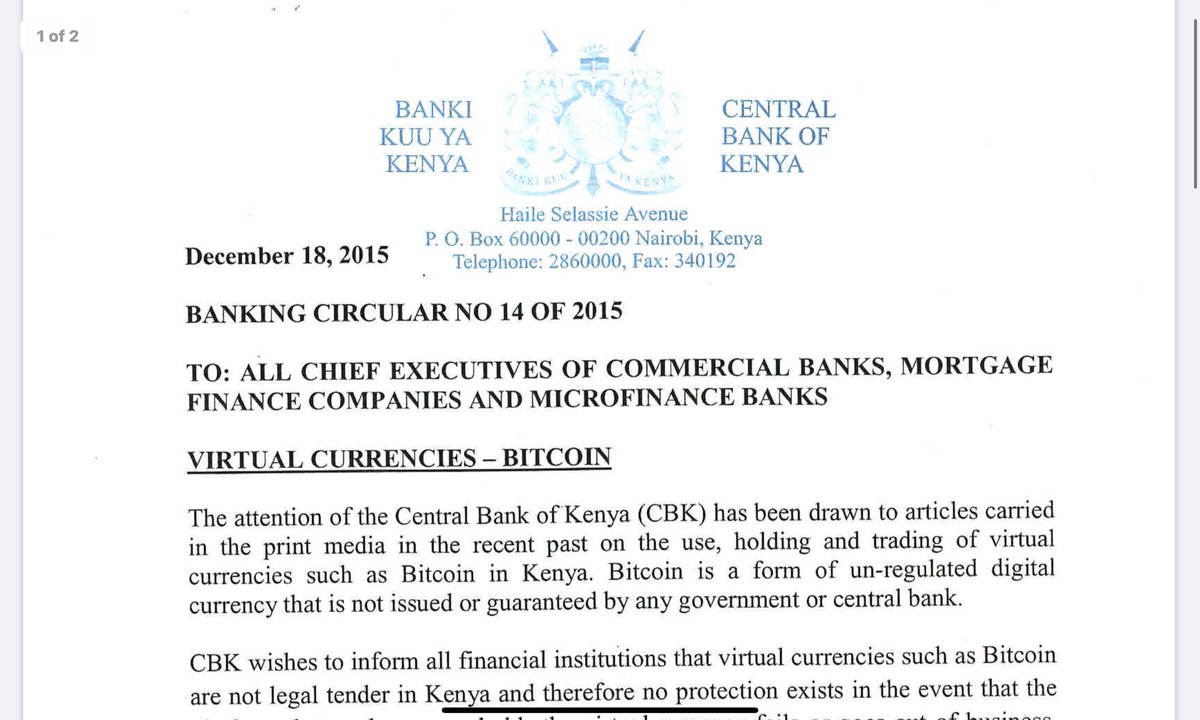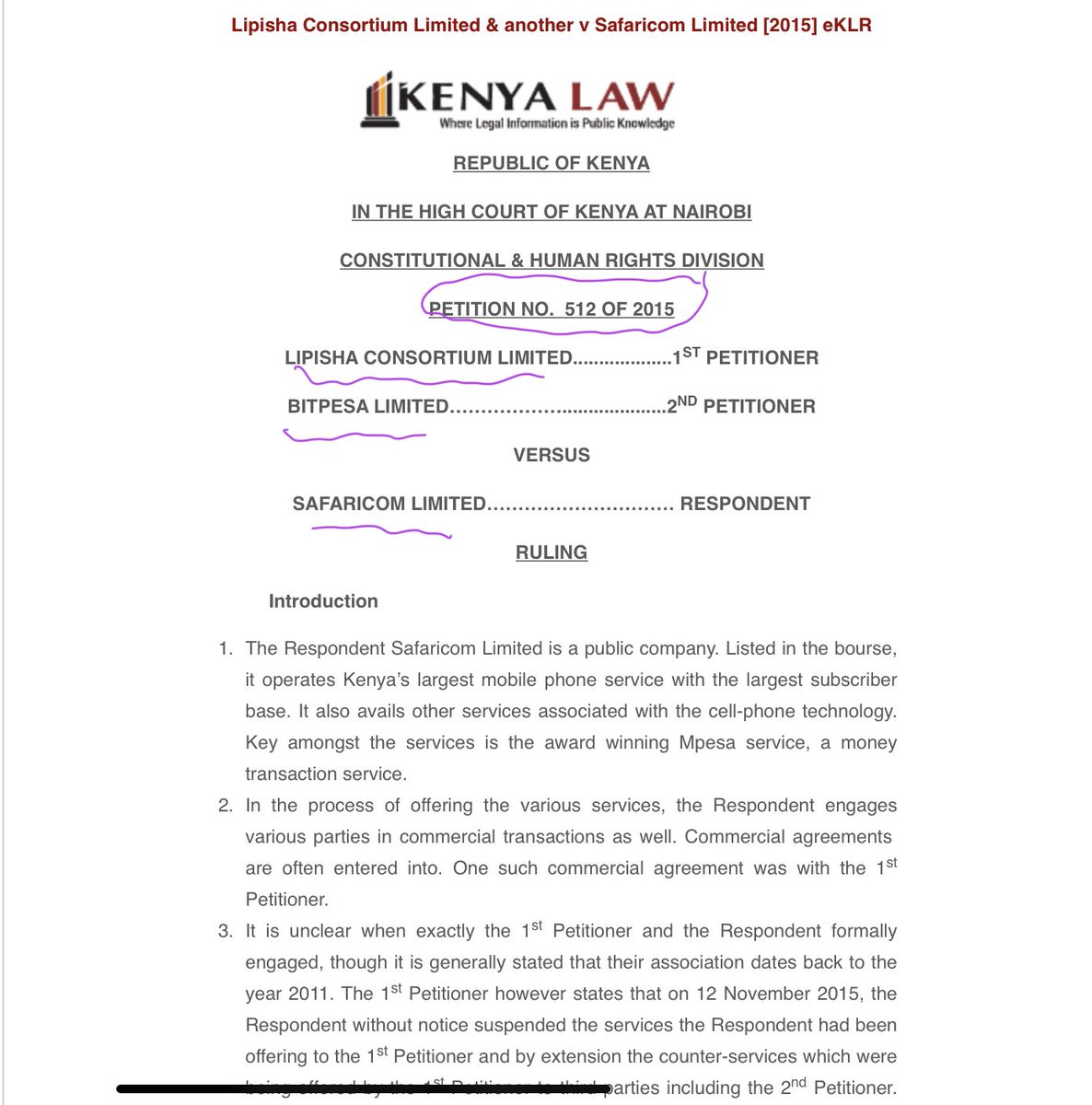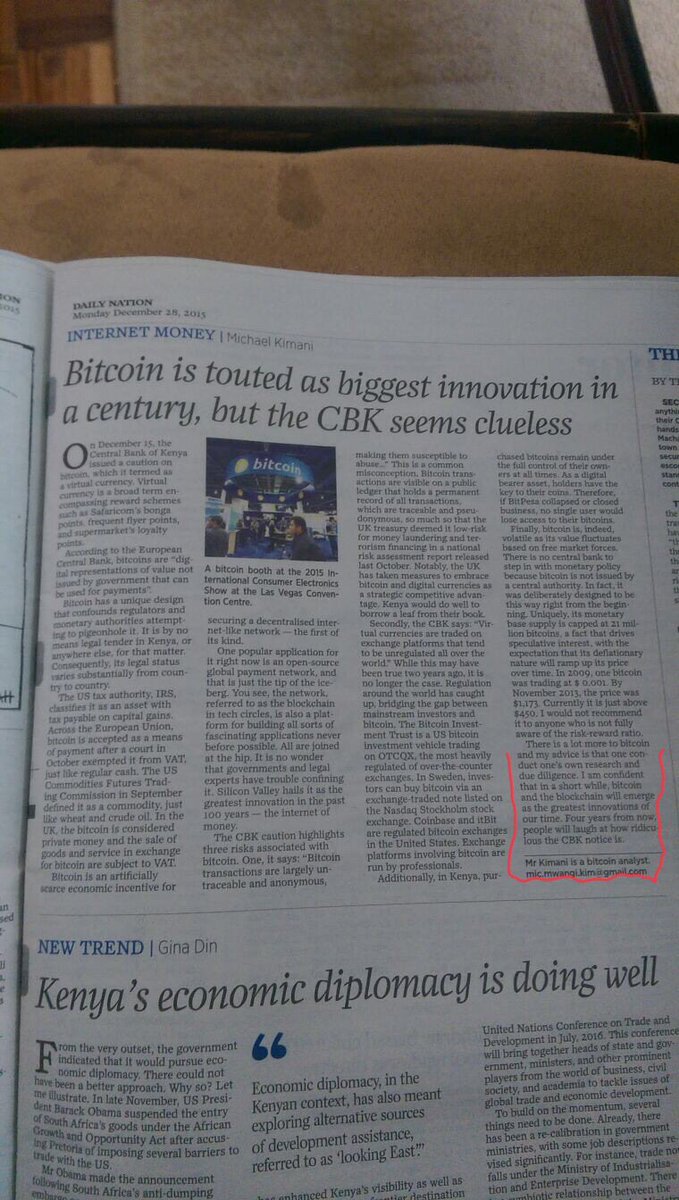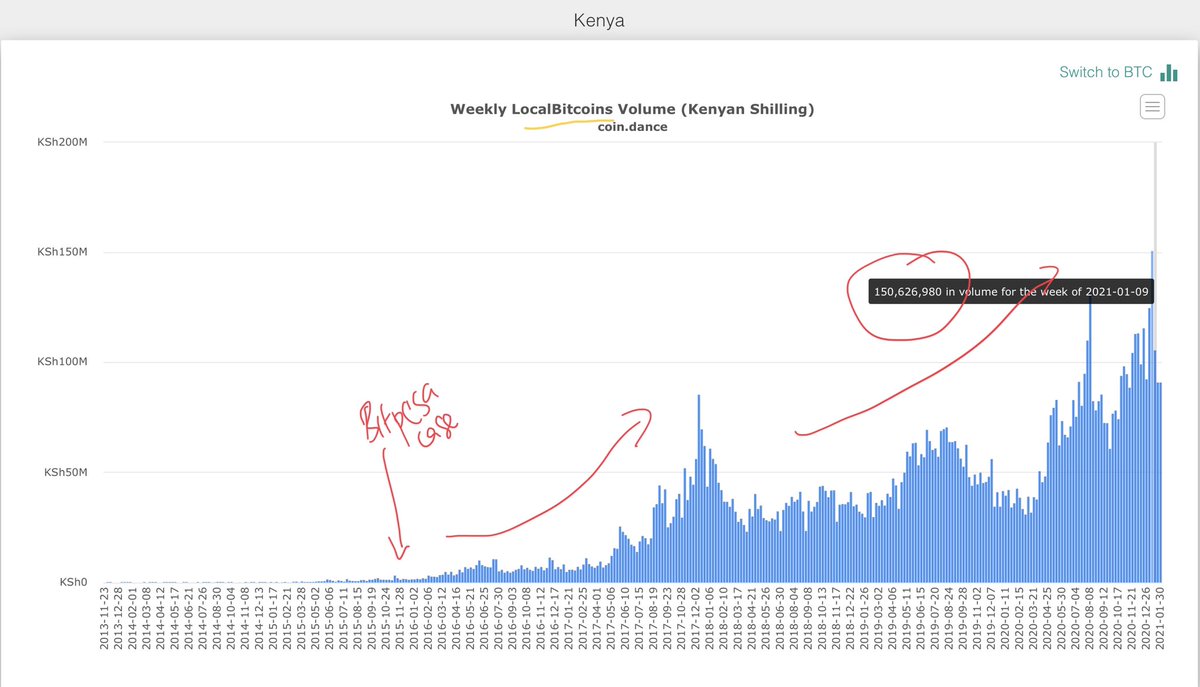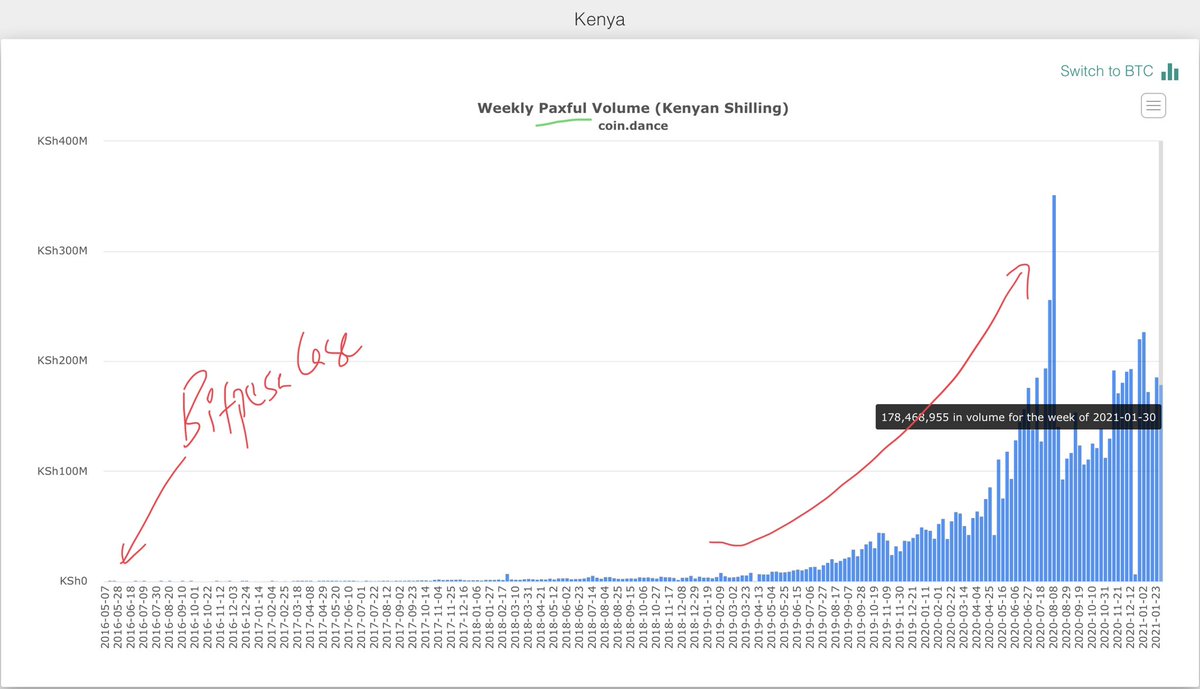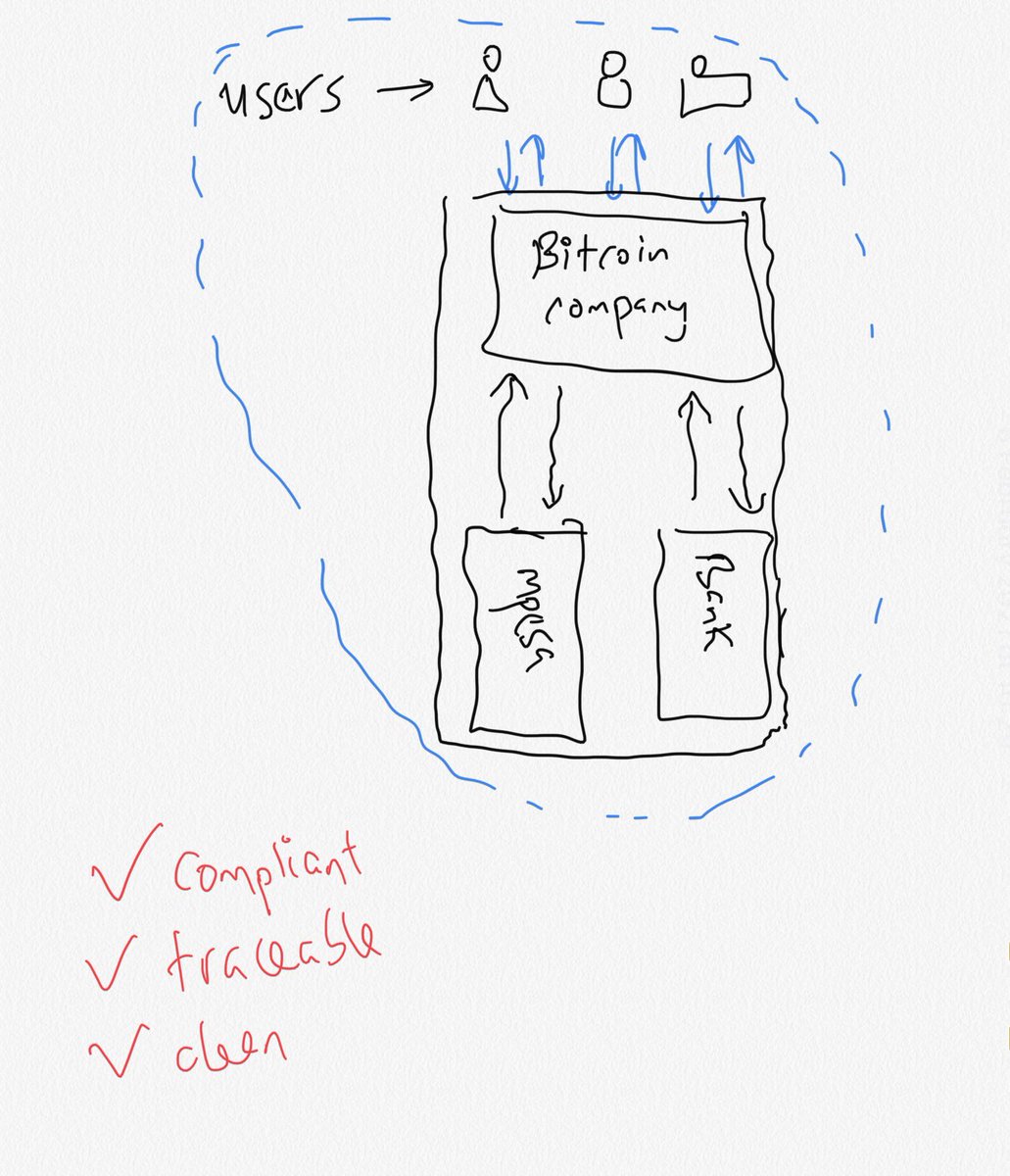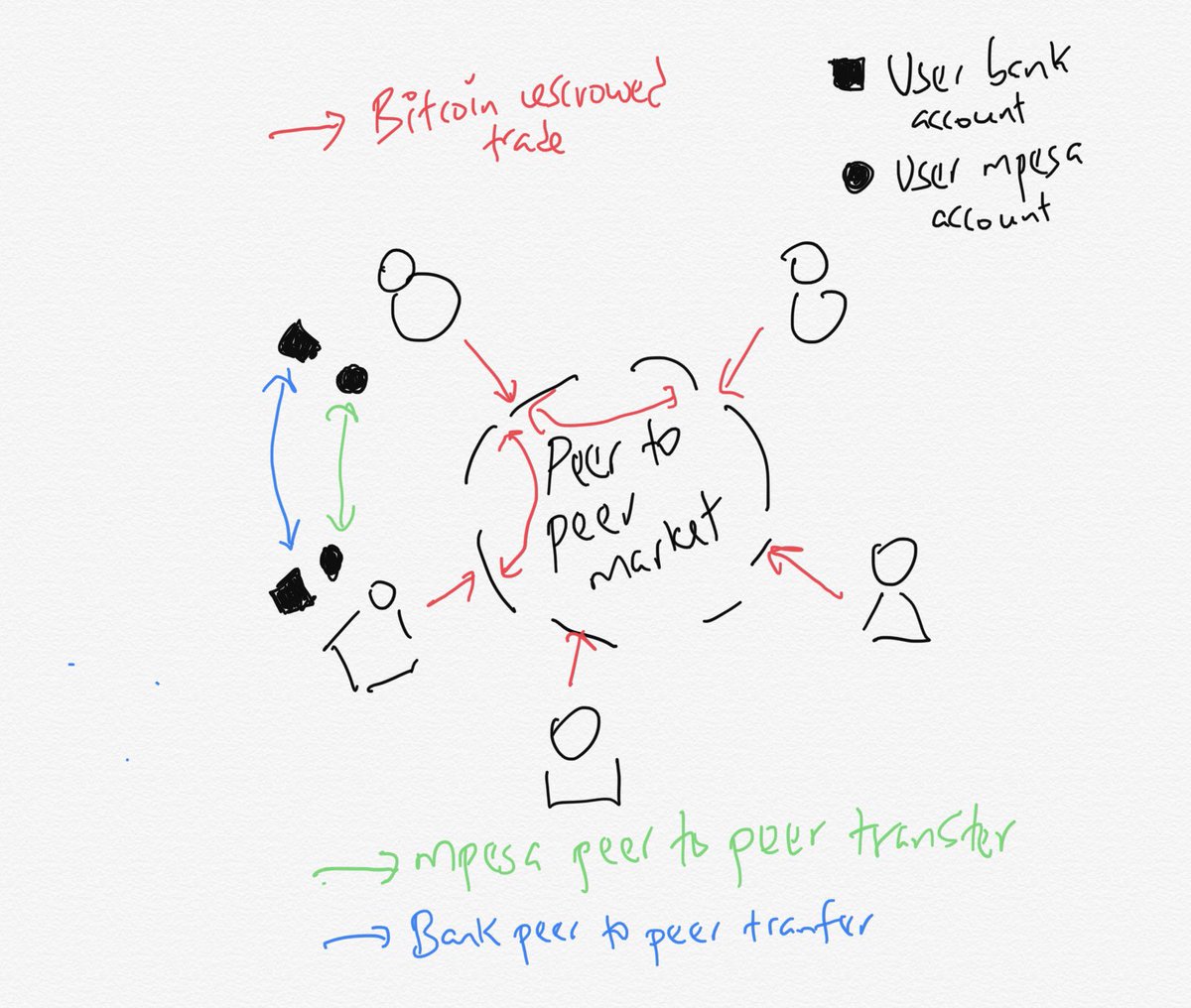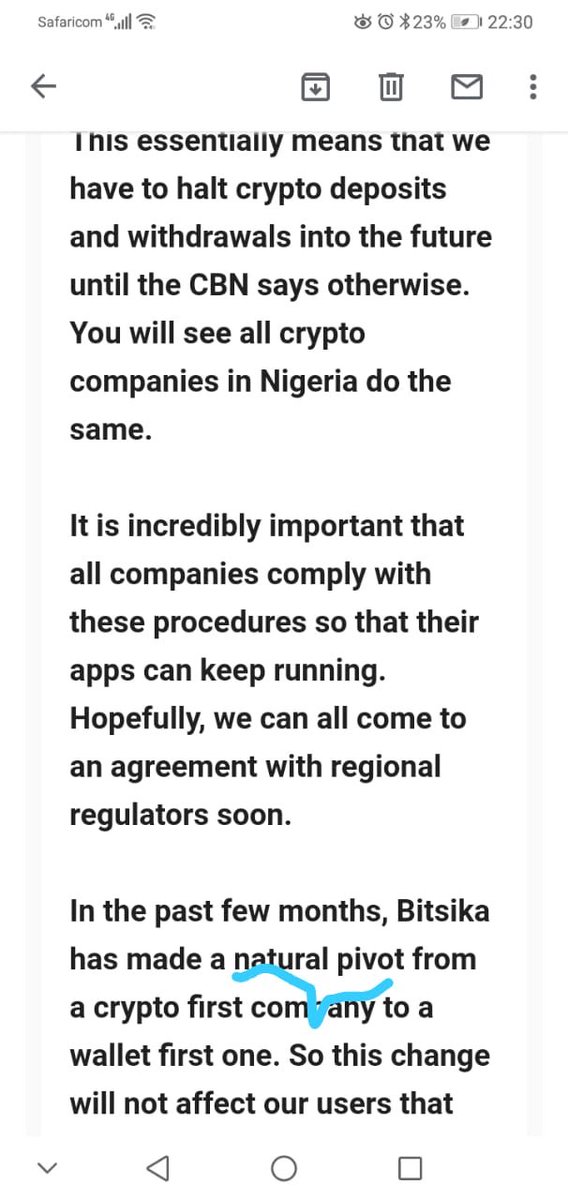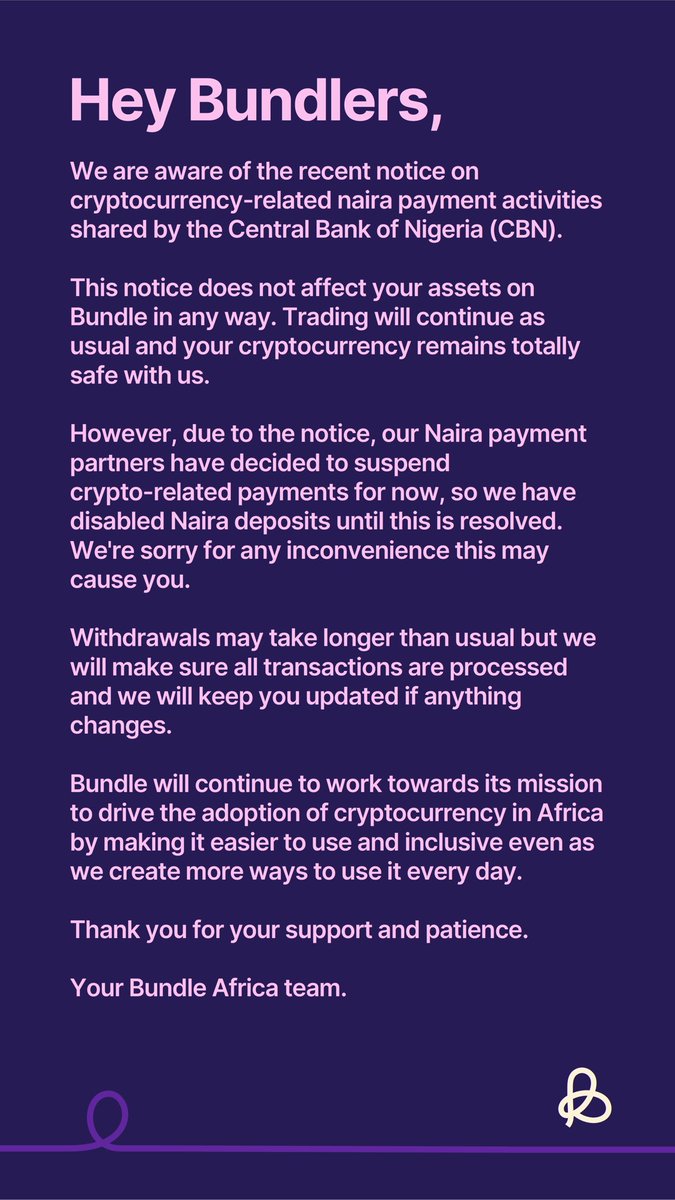This is the notice by the Central Bank of Nigeria  barring regulated financial instiututions from facilitating payments from cryptocurrency exchanges
barring regulated financial instiututions from facilitating payments from cryptocurrency exchanges
dated February 5, 2021
 barring regulated financial instiututions from facilitating payments from cryptocurrency exchanges
barring regulated financial instiututions from facilitating payments from cryptocurrency exchanges dated February 5, 2021
This is a similar notice by the Central Bank of Kenya  prohibiting Kenyan banks from processing payments for Virtual currency businesses
prohibiting Kenyan banks from processing payments for Virtual currency businesses
Dated December 18, 2015 https://www.centralbank.go.ke/uploads/banking_circulars/2075994161_Banking%20Circular%20No%2014%20of%202015%20-%20Virtual%20Currencies%20-%20Bitcoin.pdf
 prohibiting Kenyan banks from processing payments for Virtual currency businesses
prohibiting Kenyan banks from processing payments for Virtual currency businessesDated December 18, 2015 https://www.centralbank.go.ke/uploads/banking_circulars/2075994161_Banking%20Circular%20No%2014%20of%202015%20-%20Virtual%20Currencies%20-%20Bitcoin.pdf
As a Kenyan from East Africa, i cant help but laugh at my crypto friends from Nigeria. Finally, they feel our pain for the last 7 years! There is a lot to unpack here so here is a thread on my associative thoughts
July 9, 2013
“Kenya’s Kipochi wallet was the first crypto bitcoin company that launched a product that allowed people in Africa to send and receive bitcoins, plus convert them to and from the Kenyan currency M-Pesa” https://www.coindesk.com/kipochi-launches-m-pesa-integrated-bitcoin-wallet-in-africa
“Kenya’s Kipochi wallet was the first crypto bitcoin company that launched a product that allowed people in Africa to send and receive bitcoins, plus convert them to and from the Kenyan currency M-Pesa” https://www.coindesk.com/kipochi-launches-m-pesa-integrated-bitcoin-wallet-in-africa
It wasn’t long before the Central bank of Kenya and Safaricom Mpesa came down on them
“Within a week our connection w/ M-Pesa through merchant provider Kopo Kopo was shut down. It took us more than a week for us to find out that Safaricom had forced Kopo Kopo to shut us down”
“Within a week our connection w/ M-Pesa through merchant provider Kopo Kopo was shut down. It took us more than a week for us to find out that Safaricom had forced Kopo Kopo to shut us down”
August 2013
“In August 2013, Kipochi received an official notification from the Central Bank of Kenya that they needed to know who we were, what we were up to and what the hell Bitcoin was.” https://blog.stakeventures.com/articles/what-actually-happened-at-kipochi
“In August 2013, Kipochi received an official notification from the Central Bank of Kenya that they needed to know who we were, what we were up to and what the hell Bitcoin was.” https://blog.stakeventures.com/articles/what-actually-happened-at-kipochi
This was the first case of a Bitcoin company in Kenya running at odds w/ the regulated (Central Bank of Kenya) and regulated financial services (Safaricom’s Mpesa). A year later i joined the industry and recall trying to work with Pelle’s Kipochi and other companies like Bitpesa
We all worked together on how we would get the banks and regulators to ease restrictions on accessing bank accounts. We needed a neutral body to champion this cause
I was tasked to set up a non-profit foundation. Here is an email dated
14th May 2014
I was tasked to set up a non-profit foundation. Here is an email dated
14th May 2014
The next company on the guillotine was Bitpesa. Bitpesa launched a crypto product allowing Kenyans to buy bitcoins using mpesa (later introduced a sell bitcoin feature). The product also plugged into a cross border remittance (Kenya - UK corridor).
This too did not last long
This too did not last long
On December 18, 2015
CBK Circular
“The purpose of this circular is to caution all financial institutions against dealing with virtual currencies or transacting with entities that are engaged in virtual currencies. Do not open accounts for anyone dealing in Bitcoin” https://twitter.com/pesa_africa/status/1357938886358556673
CBK Circular
“The purpose of this circular is to caution all financial institutions against dealing with virtual currencies or transacting with entities that are engaged in virtual currencies. Do not open accounts for anyone dealing in Bitcoin” https://twitter.com/pesa_africa/status/1357938886358556673
A couple of days later, Safaricom Mpesa CEO Bob Collymore spoke out against virtual currencies saying
“We will not agree to have bitcoin-related transactions on its M-Pesa system unless the virtual currency is authorised by the banking sector regulator.” https://www.businessdailyafrica.com/bd/corporate/companies/collymore-says-safaricom-will-not-risk-cbk-s-wrath-over-bitcoin-transactions-2103900
“We will not agree to have bitcoin-related transactions on its M-Pesa system unless the virtual currency is authorised by the banking sector regulator.” https://www.businessdailyafrica.com/bd/corporate/companies/collymore-says-safaricom-will-not-risk-cbk-s-wrath-over-bitcoin-transactions-2103900
It all seemed coordinated.
No access to bank account and Mpesa gateway services crippled Bitpesa business. Bitpesa and Lipisha (payment gateway partner) took the matter to court
Petition NO. 512 of 215 http://kenyalaw.org/caselaw/cases/view/117270/
No access to bank account and Mpesa gateway services crippled Bitpesa business. Bitpesa and Lipisha (payment gateway partner) took the matter to court
Petition NO. 512 of 215 http://kenyalaw.org/caselaw/cases/view/117270/
December 28, 2015
I penned an opinion article for Kenya’s leading newspaper the Daily Nation, bashing the CBK for foolish short term thinking. I said “4 years from now people will laugh at CBK for this ridiculous notice”
1 Bitcoin at the time was $450, today it is $40,000
I penned an opinion article for Kenya’s leading newspaper the Daily Nation, bashing the CBK for foolish short term thinking. I said “4 years from now people will laugh at CBK for this ridiculous notice”
1 Bitcoin at the time was $450, today it is $40,000
November 26, 2015
A lawsuit filed by bitcoin payments startup BitPesa and its partner against mobile money giant Safaricom was heard in the Kenyan High Court on Tuesday. https://www.coindesk.com/safaricom-and-bitpesa
A lawsuit filed by bitcoin payments startup BitPesa and its partner against mobile money giant Safaricom was heard in the Kenyan High Court on Tuesday. https://www.coindesk.com/safaricom-and-bitpesa
Bitpesa argued Safaricom “intimidated” its gateway partner, Lipisha, forcing it to suspend its services on November 12th without prior notice causing BitPesa and Lipisha significant challenges maintaining their business.
Safaricom argued that the suspension of service to Lipisha was justified because Bitpesa had failed to obtain authorisation for bitcoin transfers from Kenya’s central bank. As a result, Bitpesa’s transactions through Lipisha and its account at Safaricom contravened AML rules.
But a lawyer for the two firms said Safaricom had misunderstood the central bank’s requirements.
“[The central bank] told BitPesa that bitcoins are not regulated in Kenya but Safaricom insists that it produces a licence to that effect,”
“[The central bank] told BitPesa that bitcoins are not regulated in Kenya but Safaricom insists that it produces a licence to that effect,”
December 15, 2015
Bitpesa lost the case
A Kenyan High Court judge has ruled that M-Pesa operator Safaricom will not be required to grant access to bitcoin startup BitPesa amid an ongoing legal dispute. https://www.coindesk.com/kenyan-court-upholds-bid-keep-bitpesa-off-mobile-money-platform
Bitpesa lost the case
A Kenyan High Court judge has ruled that M-Pesa operator Safaricom will not be required to grant access to bitcoin startup BitPesa amid an ongoing legal dispute. https://www.coindesk.com/kenyan-court-upholds-bid-keep-bitpesa-off-mobile-money-platform
With no access to Bank accounts and Mpesa gateway services critical for operations, Bitpesa gradually pivoted away from business in Kenya.
Bitpesa was a critical gateway for accessing Bitcoins (buy and sell), so their departure, affected behavior on how users accessed bitcoins.
Bitpesa was a critical gateway for accessing Bitcoins (buy and sell), so their departure, affected behavior on how users accessed bitcoins.
The biggest beneficiary was peer to peer bitcoin markets which do not require an intermediary with banking or Mpesa services.
Local bitcoins was the first to cater to demand. See this chart of growing volumes since Bitpesa was shut down. Current volumes 150 million per week
Local bitcoins was the first to cater to demand. See this chart of growing volumes since Bitpesa was shut down. Current volumes 150 million per week
You see, regulators are foolish and do not gerrit. When you shut down formal channels for buying and selling bitcoin, peer to peer trades pick up b/c the nature of bitcoin and cryptocurrencies is peer to peer. Peer to peer transactions are informal and hidden.
Here is a chart of Kenya’s peer to peer volumes on another peer to peer market, Paxful. Weekly volumes, 178 million per week as of last week
With a set up like Bitpesa, the regulator can force compliance through enforced reporting and can keep track of money moving in and out of bitcoin and cryptocurrencies.
With peer to peer markets, the nature of the transaction is untraceable b/c money moves from a individual user account to another individual users account, the bank, Mpesa and regulator cannot tell the purpose of the value transfer. When in fact, it was a bitcoin trade
local bitcoins 150 million KES per week
Paxful 178 million KES per week
binance P2P (unknown
Local cryptos (unknown)
Offline trades (unknown)
Offshore trades (unknown)
Citibank 2018 suggested Kenyans hold 163 billion in Bitcoin
Paxful “Kenyans traded 6 billion in 2020”
Paxful 178 million KES per week
binance P2P (unknown
Local cryptos (unknown)
Offline trades (unknown)
Offshore trades (unknown)
Citibank 2018 suggested Kenyans hold 163 billion in Bitcoin
Paxful “Kenyans traded 6 billion in 2020”
See, there is no way to tell exactly how much money is moving through, in and out of bitcoin and cryptocurrencies. This is the conundrum for regulators. They think they smart by shutting down formal channels, but only serve to prop up informal hidden volumes
My conservative estimates is
500 million weekly in Kenya multiples by 52 weeks, roughly 25 billion per annum.
multiples by 52 weeks, roughly 25 billion per annum.
Conservative estimates
500 million weekly in Kenya
 multiples by 52 weeks, roughly 25 billion per annum.
multiples by 52 weeks, roughly 25 billion per annum.Conservative estimates
Peer to peer trading of bitcoin and cryptocurrencies is the only model that works despite the position of Central Banks. it has been great for creating earning opportunities for young people
see this thread https://twitter.com/pesa_africa/status/1351786081474252800
see this thread https://twitter.com/pesa_africa/status/1351786081474252800
Peer to peer and informal trading of cryptocurrencies like Bitcoin is an added cyber security risk to Kenya’s financial system b/c money flows into bitcoin cannot be recovered
June 30, 2020
Bitcoin Case at Kenya’s Milimani Law Courts Sets Precedence https://kenyanwallstreet.com/bitcoin-case-kenyas-milimani-law-courts-sets-precedence/
June 30, 2020
Bitcoin Case at Kenya’s Milimani Law Courts Sets Precedence https://kenyanwallstreet.com/bitcoin-case-kenyas-milimani-law-courts-sets-precedence/
I find it amusing that Kenyan regulators, officials and ‘Fintech’ experts think cryptocurrencies can be ‘swept under the rug’, it merely exposes their foolishness. Ive met A LOT of them in my 7 years and they DO NOT GERRIT!
Every year they delay, informal volumes grow
Every year they delay, informal volumes grow
December 16, 2020
 UGANDA recently made ammendments to their Anti Money Laundering Act 2013 to include virtual asset service providers. Perhaps the only notable effort from government in the region to address the issues above https://twitter.com/pesa_africa/status/1339071354507759616
UGANDA recently made ammendments to their Anti Money Laundering Act 2013 to include virtual asset service providers. Perhaps the only notable effort from government in the region to address the issues above https://twitter.com/pesa_africa/status/1339071354507759616
 UGANDA recently made ammendments to their Anti Money Laundering Act 2013 to include virtual asset service providers. Perhaps the only notable effort from government in the region to address the issues above https://twitter.com/pesa_africa/status/1339071354507759616
UGANDA recently made ammendments to their Anti Money Laundering Act 2013 to include virtual asset service providers. Perhaps the only notable effort from government in the region to address the issues above https://twitter.com/pesa_africa/status/1339071354507759616
February 5, 2020 (Present) Day
In my opinion, due to the circular by the Central Bank of Nigeria , we should expect to see the same patterns witnessed in Kenya
, we should expect to see the same patterns witnessed in Kenya  https://twitter.com/pesa_africa/status/1357936837893963776
https://twitter.com/pesa_africa/status/1357936837893963776
In my opinion, due to the circular by the Central Bank of Nigeria
 , we should expect to see the same patterns witnessed in Kenya
, we should expect to see the same patterns witnessed in Kenya  https://twitter.com/pesa_africa/status/1357936837893963776
https://twitter.com/pesa_africa/status/1357936837893963776
In fact, i wager, we multiple times of magnitude b/c Nigeria is 10 times bigger than Kenya  and has a long history with currency devaluations and informal currency trading
and has a long history with currency devaluations and informal currency trading
See this thread https://twitter.com/pesa_africa/status/1304060041268539392?s=20 https://twitter.com/pesa_africa/status/1304060041268539392
 and has a long history with currency devaluations and informal currency trading
and has a long history with currency devaluations and informal currency trading See this thread https://twitter.com/pesa_africa/status/1304060041268539392?s=20 https://twitter.com/pesa_africa/status/1304060041268539392
Here is a story of how Nigeria’s informal networks use trusted networks, e-word of mouth and reputation to support the trade of bitcoin and cryptocurrencies offline https://twitter.com/pesa_africa/status/1255808792916365312
Here is an article on the mechanics of informal trade borrowed from Somali Hawala networks. Exactly the same mechanisms at play in Bitcoin crypto peer to peer informal trades (online and offline) https://kioneki.com/2019/12/15/how-somali-traders-innovate-on-informal-financial-practices-using-bitcoin/
“data compiled from Coin Dance by the global crypto platform Paxful, shows Nigeria is the largest P2P bitcoin marketplace in the world, over 52% of the market share. In the past 5 yrs 60,215 bitcoin transactions valued at $566 million, placing it second behind the United States”
This is data from Paxful only, one of the many peer to peer bitcoin trading platforms. My friends in Nigeria tell me there is A LOT more P2P trading activity than is captured by official statistics.
“In 2020, Nigerians traded more than $400m worth of crypto on local crypto exchange platforms” https://techpoint.africa/2021/01/06/nigerians-traded-more-than-400m-worth-crypto-2020/
Crypto businesses in Nigeria  have informed users they cannot access fiat withdrawals via officially regulated channels.
have informed users they cannot access fiat withdrawals via officially regulated channels.
“Bundle processed Over $85 Million and Registered Over 124K Users in 2020”
 have informed users they cannot access fiat withdrawals via officially regulated channels.
have informed users they cannot access fiat withdrawals via officially regulated channels.“Bundle processed Over $85 Million and Registered Over 124K Users in 2020”
Does anyone honestly think that a ban on official payment channels by Central Banks will cut short interest in bitcoin and cryptocurrencies? What, with the price going up, and all the earning opportunities emerging from cryptocurrencies, dapps and use cases?
This is a political battle between the old legacy banking cartels and the subversive feature of bitcoin cryptocurrencies. In all my years of experience, I am convinced bitcoin and cryptocurrencies will win. African governments and banks lack capacity and no influence.
Their only choice is to co-opt cryptocurrencies like Bitcoin, before it is too late.
I’m going to try pitch my editor this thread as an article.
/END
/END

 Read on Twitter
Read on Twitter